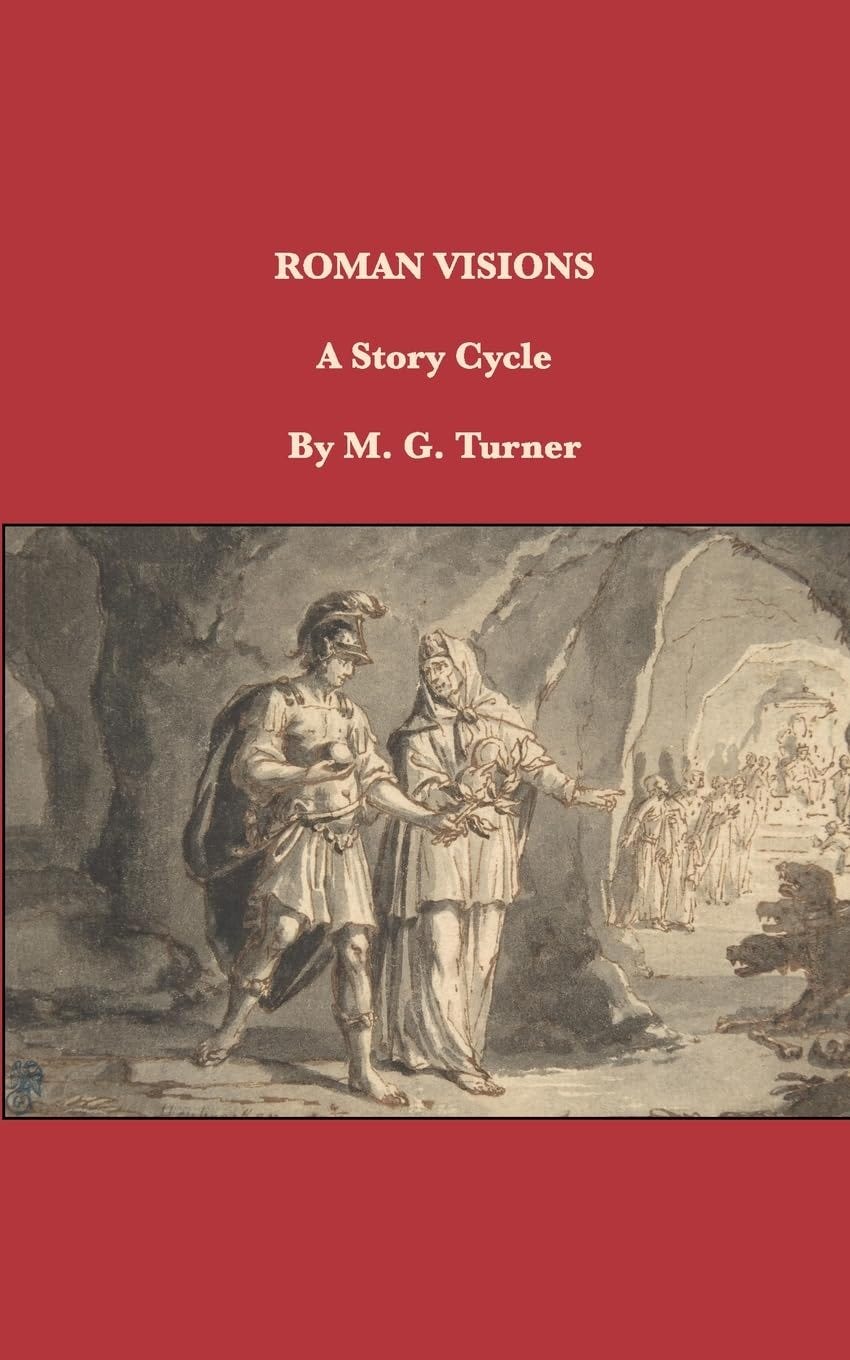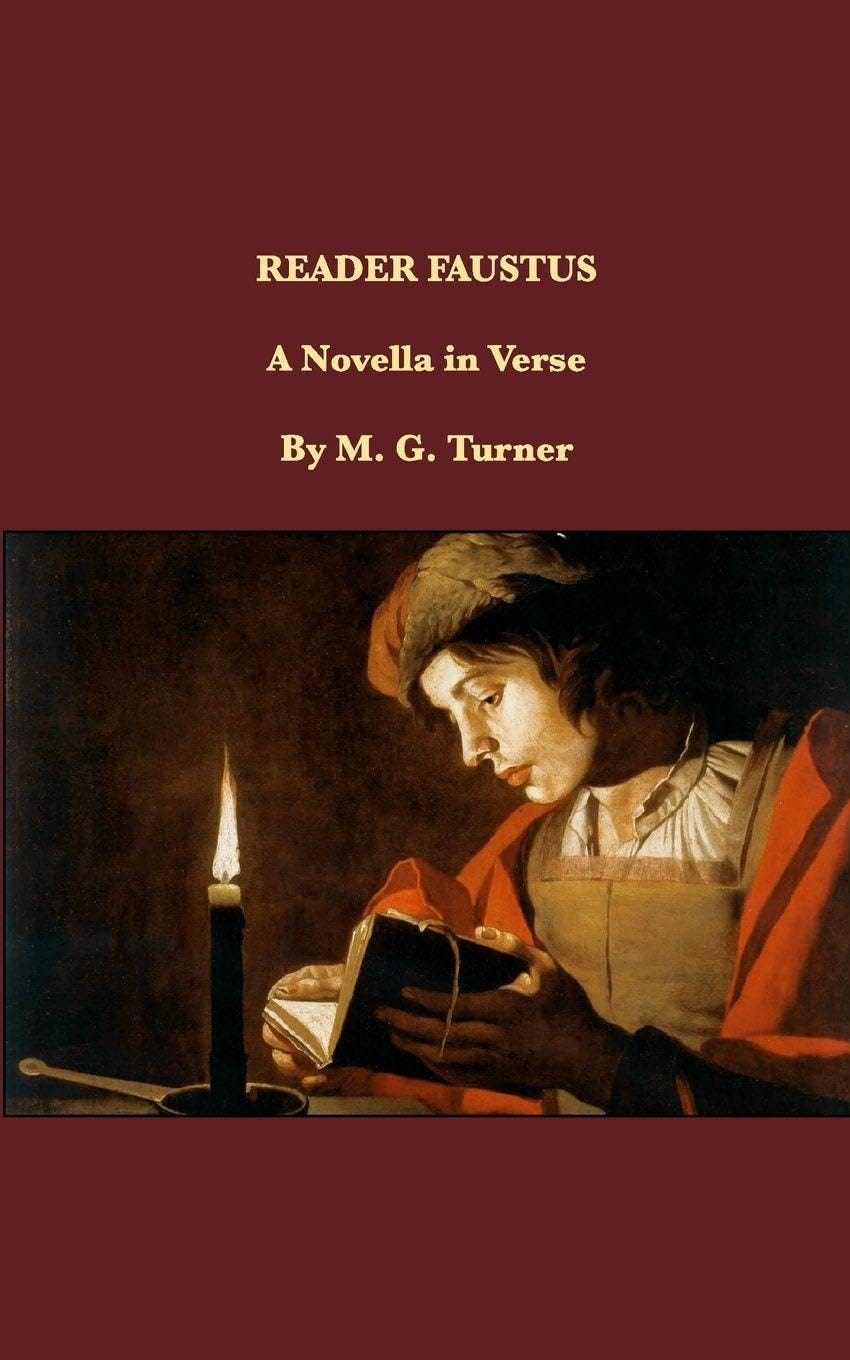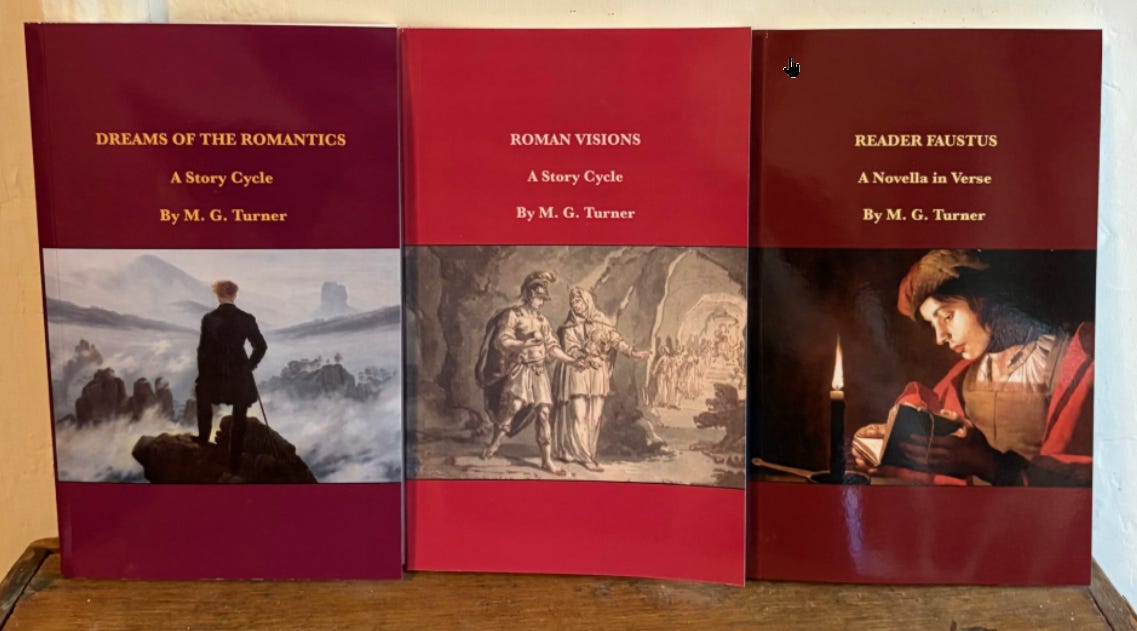Two New Chapbooks by M. G. Turner
Roman Visions: A Story Cycle and Reader Faustus: A Novella in Verse
My literary education has a noticeable gap when it comes to poetry and the ancient classics. While I’ve made some progress with modern classics, the older works remain largely unexplored. And poetry, in particular, has never been my natural choice—not out of dislike, but because it demands a deliberate effort to interpret and appreciate. Much like music, poetry requires critical engagement to uncover the emotions, imagery, and intent woven into its structure. It’s an art form that rewards patience and thoughtful reading, offering depth that casual consumption often misses.
There exist many guides as to how to read poetry, how to listen to music, and even modern translations of the ancient classics so that the present-day reader can comprehend the story.
I, however, have a come into contact with a personal guide of sorts, a fine writer who has whetted my appetite to dig a little deeper in the areas of poetry and Greek Classical literature. This person writes by the nom de plume of M. G. Turner, and I previously reviewed his Dreams of the Romantics here at The Seaboard Review of Books. It led me to read more Percy Bysshe Shelley and other poets of the Romantic Period.
Now, in quick succession, he has launched two more titles, Roman Visions: A Story Cycle and Reader Faustus: A Novella in Verse.
Roman Visions picks up where Virgil’s The Aeneid abruptly ends: that of Aeneas defeating his archenemy Turnus. What became of this famed warrior thereafter? Mr. Turner cleverly takes up the challenge by framing the discovery of “Book 13: The Sorrows of Aeneas” in a late history professor’s desk. Not composed by Virgil, but by the professor himself, an expert in the Greek Classicists. Among other loose ends, it has our hero visiting Dido in the Underworld, to make an apology (“A true one and not erected in the shadow of an excuse”) for his leaving her so abruptly.
Aeneas also comes to realize the futility of war:
It was wrong to kill and slay, to torture and degrade -he saw clearly that war was indeed a fever, not dissimilar to the kind of brain-fog that caused Hercules to murder his own children; and so his mourning was not just for his men, but for himself and all those he had abruptly sent down to the Underworld, a place he had visited and whose fell aspect still haunted his dreams. Thus the feeling death, of death’s presence, was a hallowed hymn sung in his ears by his own conscience. Why had he killed Turnus when the warrior had begged to be Given back to his people, wounded and dishonored? Aeneas answers his own question: “Because of the boy Pallas, and the belt Turnus had taken, the belt that he still wore around his waist that had so brutally spurred his revenge.”
Mr. Turner excels at recreating the language of an academic translation of The Aeneid quite well. The translation I actually read was recommended by Mr. Turner: the David West translation, published by Penguin Classics. I had previously read The Odyssey, so the storyline and the gods encountered in The Aeneid were not unfamiliar to me. Is it a satisfactory conclusion to The Aened? I’ll let the reader decide, but it certainly was fascinating to read.
Aside from “Book 13”, Roman Visions includes six other short works, the most outstanding of which is “The Shell Collectors” which concerns the army of Caligula, who, after successfully concluding a battle, are ordered by the Emperor to “collect shells” to bring back to Rome. One of the warriors, having been trained to kill and lacking in conscience, is jealous of an aged warrior, Lucius, who is successful in gathering the most shells. A study in greed, avarice, and the plight of idle warriors with no war to fight, “The Shell Collectors” was a page-turning read, again in the clever style of a translated classic.
Reader Faustus: A Novella in Verse is Mr. Turner’s most recent offering, and he adapts the well-known story of Faust selling his soul to the Devil. In the author’s preface, Mr. Turner confesses:
It is my intention with this “novella in verse” to reawaken the Faust legend for a modern audience, just as the legend was awoken for me over the last few years of study and contemplation of this most perennial of myths. I should also stress that this piece was written during an extensive period of deep reading in which I found myself going to bookstores nearly every day and buying books, mostly by classical authors, which I began to read almost as soon as I carried them home.
Mr. Turner’s Faust is likewise a voracious reader. It is his only pleasure, and he delights in it. Then, one day, he is struck by “a mysterious ague” that affects his vision:
But when he put his eyes to page
A sudden shift occurred:
He could no longer read
Without tripping on every word.
He calls out to “The Master of the Universe” for assistance. We know what happens next. However, Faust’s initial joy at being able to read soon turns to regret as:
The good feeling he’d engendered, The pride with which he read. For each book upon his desk Now seemed empty, as if dead.
Faust must get his soul back! But who will come to his aid? Let the reader discover his fate.
As wise King Solomon said: “of making many books there is no end; and much study is a weariness of the flesh.” (Ecclesiastes 12:12, KJV) Very true, and in today’s parlance, the word “book” might well be substituted by “website” “reels” or “posts” as the term “doomscrolling” has become part of the modern lexicon. There is no end to the amount of time that can be spent reading all the information/misinformation out there, and now with AI in the mix, it has indeed become wearisome. As Mr. Turner notes (again, in his Preface), “it is this paradoxical pursuit that makes us ill, or gets us into serious trouble.” Sound, practical insights on today’s world.
As with Roman Visions, Reader Faustus comes with added gems such as “The Tale of Hans Drumpf” (a tongue-in-cheek reflection on current events), “Johan Fust, Patron of Gutenberg”, and his father Philip Turner’s 1974 essay, “Faust, Man and Myth”.
Roman Visions and Reader Faustus stand as a testament to the talent of this promising author, warranting serious consideration.
About the Author
M. G. Turner is a professional writer and literary agent in New York City. In 2025 he published his first book, “Dreams of the Romantics,” a chapbook story cycle about the English Romantic poets and their gothic lives which was reviewed favorably by The Seaboard Review of Books and by renowned critic of weird fiction S. T. Joshi in his periodical Spectral Realms; it is being sold in bookstores in NYC. His two other books are a story cycle about Ancient Rome, “Roman Visions,” and a poetry art book, “Sotapanna.” In 2025 his personal essay on movie special effects pioneer Ray Harryhausen was published in the Winter issue of Videoscope Magazine. He also has a gothic tale called “The Apparatus” in the new horror collection “The Promethean Archives,” from the indie press The Word’s Faire. In 2019, Turner was the editor of the KGB Bar literary journal and ran events and open mic nights at the storied literary venue. In the literary field, he has worked with numerous distinguished authors and scholars including photojournalist Ruth Gruber, Eloise illustrator Hilary Knight, and “Boys in the Band” playwright Mart Crowley. As a student, he won a Scholastic Award for fiction in the category of humor.
About the Reviewer
James M. Fisher is the Editor-in-Chief of The Seaboard Review of Books. He lives in Miramichi New Brunswick with his wife Diane, their Tabby cat Eddie and Buster the Border Collie. James works as an MRI Technologist at the Miramichi Hospital.
Book Details
At this time, the author is seeking a Canadian publisher. In the meantime, here are some options to obtain his books:
Offer: A Bundle of M. G. Turner’s Three Chapbooks: https://philipsturner.com/2025/11/14/offering-a-bundle-of-m-g-turners-three-chapbooks/
Other Options:







Thanks for writing this, it clarifies a lot; your reflection on poetry requiring deliberate effort and critical engagement to truly uncover its depth speaks volumes to my own developing understanding.